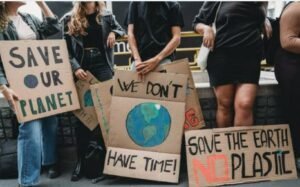The Global Impact of Climate Change
The climate change crisis looms as one of the most pressing challenges of our time, with far-reaching consequences that extend beyond environmental concerns. From rising temperatures to increased natural disasters, the impact of climate change is felt globally, affecting both the planet and its inhabitants. Here, we will try to explore the current state of the climate crisis, its impacts on the global climate, and the profound effects it has on human populations, coupled with the surge in natural calamities and disasters worldwide.
The Climate Crisis Unveiled:
1. Rising Temperatures:
The Earth’s average temperature is on the rise, primarily due to the increased concentration of greenhouse gases in the atmosphere. This warming trend contributes to the melting of glaciers, rising sea levels, and disruptions to ecosystems. The emission of Carbon dioxide, Methane, and nitrous oxide concentrations are more abundant in the earth’s atmosphere of all time. The average global temperature has increased by a little more than 1 degree Celsius since 1880 and two thirds of warming has happened since 1975.
2. Extreme Weather Events:
The frequency and intensity of extreme weather events, such as hurricanes, heatwaves, droughts, and floods, have escalated. These events not only pose immediate threats to communities but also lead to long-term consequences, including food shortages and displacement.
Recent examples of such extreme weather events comprises, worst floods in Somalia and Kenya, deadly storm Ciaran rips through Western Europe, powerful hurricane Otis hits Mexico , Thousands displaced by floods in Ghana and dams overflow. The damages and destruction and the magnitude of floods in Volta region ,Ghana was worrisome and a red alert for world community.
3. Melting Ice Caps and Rising Sea Levels:
The polar ice caps are melting at an alarming rate, contributing to the rise in sea levels. This poses a direct threat to coastal regions and island nations, leading to erosion, saltwater intrusion, and the submergence of low-lying areas.
Even small increase can have devastating effects on social habitats of small island nations, it can cause destructive erosion, wetland flooding, aquifer and agricultural soil contamination with salt, and lost habitat for fish , birds, and plants.
4. Disruption of Ecosystems:
Climate change disrupts ecosystems and biodiversity, threatening plant and animal species. Shifts in temperature and precipitation patterns can lead to habitat loss, impacting food chains and ecosystem services essential for human survival.
Impacts on Human Populations:
1. Food Insecurity:
Changes in climate patterns affect agriculture, leading to disruptions in crop yields and food production. This, in turn, contributes to food insecurity, impacting vulnerable populations and exacerbating global hunger.
2. Water Scarcity:
Climate change influences precipitation patterns, resulting in water scarcity in various regions. This scarcity affects access to clean water for drinking, sanitation, and agricultural practices, amplifying the risk of water-related diseases.
3. Health Risks:
The climate crisis is associated with increased health risks, including the spread of infectious diseases, heat-related illnesses, and respiratory problems due to air pollution. Vulnerable populations are particularly at risk.
As per WHO ( World Health Organization), the Intergovernmental Panel on Climate Change’s (IPCC) Sixth Assessment Report (AR6) concluded that climate risks are appearing faster and will become more severe sooner than previously expected, and it will be harder to adapt with increased global heating.
It further reveals that 3.6 billion people already live in areas highly susceptible to climate change. Despite contributing minimally to global emissions, low-income countries and small island developing states (SIDS) endure the harshest health impacts. In vulnerable regions, the death rate from extreme weather events in the last decade was 15 times higher than in less vulnerable ones.
 |
| Health Risks due to climate Change -WHO |
4. Migration and Displacement:
As a consequence of climate-induced events such as storms, floods, and rising sea levels, communities are forced to migrate or face displacement. This phenomenon, known as climate-induced migration, poses challenges for both affected communities and the regions receiving displaced populations.
 |
| Melting of Globe |
Surge in Natural Calamities:
1. Intensification of Hurricanes and Typhoons:
The warming of oceans contributes to the intensification of hurricanes and typhoons, leading to more destructive storms with higher wind speeds and increased rainfall, resulting in widespread damage and flooding.
2. Wildfires:
Rising temperatures and changing precipitation patterns create conducive conditions for wildfires. Regions such as Australia, the United States, and the Mediterranean face increased wildfire risks, threatening ecosystems and human settlements.
3. Increased Frequency of Heatwaves:
Heatwaves have become more frequent and severe, posing risks to human health, agriculture, and infrastructure. Vulnerable populations, especially the elderly and those without access to air conditioning, face heightened dangers.


